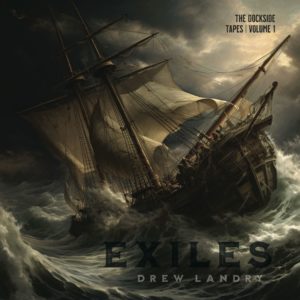On his first domestic full-length release in 16 years, Drew Landry refers to Exiles as a love letter to Louisiana, the place of his origin. Since the troubadour’s relocation to Big Sky Country Montana and the Blackfeet Indian Reservation eight years ago, Landry’s appreciation for his La Louisiane and Cajun culture has only deepened, manifested throughout this nine-track/five-originals affair.
“Acadian Wind” and “Exiles” are the most prominent examples. “Acadian Wind” feels like something from The Band, but with Eric Adcock, not Garth Hudson, eloquently leading the way on the ivories. Initially, it references the Grand Dérangement and the Acadians’ refuge in South Louisiana. It then shifts to the current day, and everything has radically changed. The coastal erosion crisis continues, the cotton industry declines, and obsolete oil rigs will eventually rust away in the gulf. It’s a longing for simpler times, as evoked by the image of paddling your pirogue through shadowy bayous.
Considering Landry is a politically motivated singer-songwriter and biting lyrics are his weapons, interestingly, the title track, Exiles, is a solemn, introspective instrumental that slowly swells and swirls with Caleb Elliot’s symphonic cello playing, and Richard Comeaux’s steel guitar chimes. Landry recreates the imaginable feeling of sadness and the mysterious, and the deportation brought to the Acadians who were forced to start over.
The album’s grooviest track, “Power,” is also the most rhythmic; its sudden stops and starts make it irresistibly danceable. Anthony Dopsie jams away on the B3 organ while Ronnie Eades bops on sax. Six other instrumentalists and percussionists and three background vocalists augmented its tour de force impact. But it’s more than just the groove. Landry is really protesting the divisions fracturing this country instead of uniting it.
If “Power” takes the cake for grooviest, “Living With the Memory” wins hands down for its most tear-jerking, gut-ripping tune of the whole kit and caboodle. One of three tunes co-written with Landry’s songwriting buddy Kenneth Richard, the song was inspired by the suicide of a close family member and knowing that makes it challenging to keep a dry eye. Lines like “It’s a shame it takes a funeral for all our friends to come back home,” “I read that letter here today,” and the title catchphrase are all too chilling and soul unsettling. But it’s just one example of why Landry’s potent material always warrants further examination and analysis.
Compared to the folk Americana albums of Landry’s past, Exiles finds Landry working in various arrangements and settings. For example, the opening track, “Love Myself,” is a rollicking pounder, with Adcock whipping the upper ivories like crazy for the blazing finale.
The other part of Exiles pays homage to Landry’s favorite songwriters, Richard Dobson (“Forever, For Always, For Certain”) and Louisiana’s Bobby Charles (“Cowboys and Indians”) and Dr. John (“Just the Same”), whom Landry had worked with on the 2010 Bobby Charles Solution to Pollution EP. These selections show that Landry doesn’t settle for low-hanging fruit when covering the material of others but reaches for the highest branch possible for the deep cuts. True, Exiles is a comeback record of sorts, but it’s also a thinking man’s record that’s impossible to digest with just cursory listens. That’s because Landry never stops thinking.
Drew Landry




